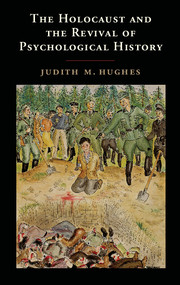
- Publisher:
- Cambridge University Press
- Online publication date:
- December 2014
- Print publication year:
- 2014
- Online ISBN:
- 9781107297876

Why did men and women in one of the best educated countries in the Western world set out to get rid of Jews? In this book, Judith M. Hughes focuses on how historians' efforts to grapple anew with matters of actors' meanings, intentions, and purposes have prompted a return to psychoanalytically informed ways of thinking. Hughes makes her case with fine-grained analyses of books by Hugh Trevor-Roper, Ian Kershaw, Daniel Goldhagen, Saul Friedländer, Christopher Browning, Jan Gross, Hannah Arendt and Gitta Sereny. All of the authors pose psychological questions; the more astute among them shed fresh light on the Holocaust - without making the past any less disturbing.
‘Elegant and accessible, Judith M. Hughes’s sober discussion probes the inner lives of Holocaust perpetrators through the lens of widely read researchers. Her book is a reminder of how varied and challenging have been responses to one of the most unsettling questions of our time: ‘how could they do it?’’
Michael R. Marrus - Chancellor Rose and Ray Wolfe Professor Emeritus of Holocaust Studies, University of Toronto
‘In this gracefully written and quite absorbing review of the historiography of the Holocaust, Hughes clarifies the psychological questions posed implicitly or explicitly by the historians. Along the way she has much of interest to say about the personalities of both the perpetrators and their chroniclers.’
Timothy Snyder - Bird White Housum Professor of History, Yale University
'The historian and psychoanalyst Judith Hughes has produced a book that will allow nonspecialists to return to past debates on the Holocaust. Her volume examines prominent figures, including Adolf Hitler, Adolf Eichmann and Albert Speer; their biographers, including Ian Kershaw, Hannah Arendt and Gita Sereny; and controversies surrounding German and Polish complicity in the persecution of the Jews, including Daniel Goldhagen’s Hitler’s Willing Executioners and Jan Gross’s Neighbors.'
Anthony D. Kauders Source: German History
'… a thought-provoking narrative about the way in which psychological questions have emerged in the Holocaust historiography, from the early post-war years until the twenty-first century.'
Danae Karydaki Source: European History Quarterly
 Loading metrics...
Loading metrics...
* Views captured on Cambridge Core between #date#. This data will be updated every 24 hours.
Usage data cannot currently be displayed.